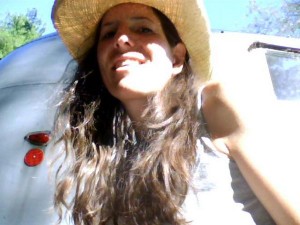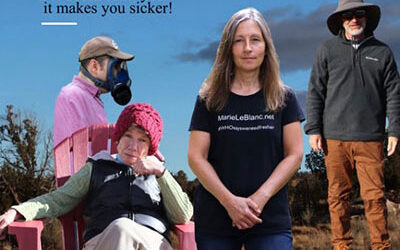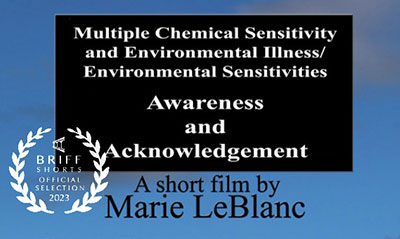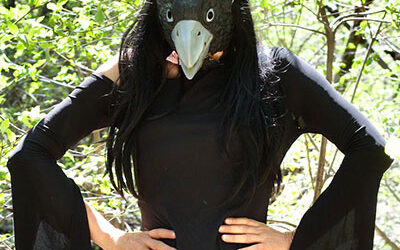 In a setup that was far too Oedipal, I was sleeping in a small room with my mother while visiting my sister in D.C., when I finally blurted out the news that I had a girlfriend, that I was bisexual and maybe gay.
In a setup that was far too Oedipal, I was sleeping in a small room with my mother while visiting my sister in D.C., when I finally blurted out the news that I had a girlfriend, that I was bisexual and maybe gay.
“Really?” Mom said, at first flustered but then supportive. “Well, good for you.”
There, I thought, satisfied as an entomologist classifying a rare butterfly. I have named it. I am queer.
My mother fell into a serene sleep. Wide-eyed and awake, I wondered if parents ever consider how much names shape their children, if they ever think how much naming something gives it meaning. My first name has egg in the middle: to me it means rebirth. I didn’t feel like I had been genetically damned to be a lesbian; I felt like a co-creator of my own identity. Not that it was simple for me to be vocal or proud. I came from a conservative town in the Midwest where lesbians were hated. But my new girlfriend was good-hearted and beautiful and stripped me like an unexpected package on a forgotten birthday. She felt too good to be a bad thing.
That time, coming out was all about abstraction and beauty and self-discovery and giving a name to desire. The second time, when I came out as disabled, it was much more ambivalent. Seven years after a pivotal viral illness that changed my life, I am still fighting to be heard and understood.
People don’t think of disability as a coming out process, but it is, especially for those of us living with hidden, debilitating chronic illness. I suffered strange vertigo and a constant sore throat before the mysterious virus hit me and I was suddenly unable to walk up a flight of stairs without serious difficulty. Almost immediately, I was profoundly and invisibly disabled, though weeks before that I had been in the best shape of my life, cycling for miles to distant farm stands through raging spring rain to buy early produce. The illness hit dramatically, but was so disorienting that I fumbled for years before fully accepting my plight. As a child, I used to have nightmares about suddenly going blind, and it was like that. The blindness in the dreams was shameful. I would try to hide it from people, feeling my way along walls to get back home. Much later, I realized how much this image reflected the Protestant, agrarian stoicism I came from. I had learned to be silent in the face of catastrophic forces. My genetic legacy was one of people who constrain and battle nature, revering its awesome power. My farmer grandfather, when faced with years of mysterious health problems and unspoken depression, simply took his own life, leaving a note saying he didn’t want to be a burden. In my family, we learned to plant and bury.
So, when I dragged myself into the office of a lesbian-run clinic in San Francisco, ashamed to confess just how sick I was, afraid I might be terminally ill, I took the belittling news with shock and grace. “It’s nothing,” said the doctor. “But you really should come back for a Pap smear soon. That’s important business.”
I learned then that women’s health is still a category largely shaped by organs that separate us from biological males. It is about breast cancer and reproductive freedom, speculums and mirrors. In the world where I was respected as a lesbian, I was quickly silenced as someone who lived in formative clinical margins. The next doctor I saw was a well-known immunologist who dealt mostly with HIV and AIDS patients. He was a sensitive New Age guy who listened. He ran eight hundred dollars worth of tests, sold me two affirmation tapes with his own, insipid voice overlaying the sound of a babbling brook, and gave me the kind of non-diagnosis that would characterize my next few years – “pharyngitis with chronic fatigue.”
I didn’t have health insurance and couldn’t really afford to go back. Don’t get me wrong: I didn’t want a diagnosis. I didn’t want to be called disabled, but I had already fallen into a strange, tripped out Wonderland where every symptom was a Cheshire cat, every day was a mad teacup ride. It was a challenge to move on most days. Not having a diagnostic label made it impossible for me to prove how sick I was or to even talk about it. Even my closest friends disbelieved me when I told them. Mostly, I looked fine. And when I finally did get a diagnosis of Chronic Fatigue Immune Dysfunction Syndrome (CFIDS), I still had to muster up the bravado to sit in front of a disability judge and admit that I was too sick on most days to even make a list of things to do, that I was bedridden then for eighteen hours a day, unable to scrub the toilet, unable to walk around the block, unable to put sentences together because my brain could not remember the simplest of instructions due to neurological damage. But I was still in a category that seemed empirically suspect. The name didn’t characterize my very real, very tangible disintegration.
I am not a scientist; I am a poet. So, when I peer into the cells of my identity I rely on metaphor to describe my most personal and ineffable experiences. The courage to say, to my family and friends, to a judge, in front of crowd where I gave literary readings, “I am disabled; I have CFIDS” required a certain trust in the power of such confining language to convey the most subjective of human experiences – intractable pain. And this courage was just a small part of the daily challenge of living in a body which, like a land overtaken by a Fascist regime, made it challenging to perform the most basic tasks.
What I didn’t realize was how much the name of my illness would affect the way people perceived my disability, would in fact shape the massive negligence that has come to characterize the plight of CFIDS victims. CFIDS is a dramatic, debilitating illness with a vague-sounding name. It steals people’s lives. It has struck Olympic athletes, film directors, writers, musicians, and – strangely – a plethora of well-known lesbian and feminist figures, knocking them down in the prime of their lives. Jazz pianist Keith Jarrett suffered in silence for two years, unable to tour, amidst speculation that he really had AIDS or cancer, before finally coming out of the closet with this much-maligned diagnosis. “This is a . . . horrible disease.” he was quoted as saying in the San Francisco Chronicle. “I’ve met people who have had it for 10 years, 25 years. Some are bedridden, some can’t walk across the street. It’s stupid to call it chronic fatigue syndrome. It should be called the forever dead syndrome.”
In its early epidemiological history, the illness was called other names, like Chronic Ebstein Barr Virus (CEBV) or the Yuppie Flu. Most people know it as Chronic Fatigue Syndrome, which the newspapers – more often than not – shorten to the damaging misnomer “chronic fatigue.” Now, patients are fighting for a more legitimate name that characterizes the relentless symptomology and gets rid of the word fatigue (which many patients call “the F word”). The problem is this: idiopathic chronic fatigue affects some 25% of the population, according to Dr. David Bell, but CFIDS is not chronic fatigue; it is a complicated disorder similar to lupus or multiple sclerosis. The fatigue is relentless, but part of a much larger complex of symptoms. Some have considered adopting the European name for the illness, myalgic encephalomyelitis, or ME, though Americans fear it will quickly be conceived as the “me disease,” symbolic of cultural myopia in the way that CFIDS has been seen as symbolic of an overworked society. The battle over etymology has raged for years, overshadowing other key issues about the illness, such as the fact that the Center for Disease Control was recently found, in an audit, to have shuffled most of its paltry CFIDS funding into unrelated accounts.
Don’t be mistaken. CFIDS is a serious and devastating plague; it just isn’t a sexy one. It is a plague with bad PR. I am convinced that CFIDS needs a big makeover, a year or two of being chic. CFIDS patients need to grace the cover of Newsweek wearing lipstick but looking just the right amount of gaunt. For awhile, it needs to scare up some attention. It needs to be the disease.
Last year, at a literary reading in front of a crowd of 400 people, mostly lesbians, I tried to scare up some attention. It was an embodied evening, a steamy, sexy affair. When I got up in front of the group, I felt compelled to mention that two of the readers that night had CFIDS. As usual, I had barely dragged myself there. I was brain-fogged, bone tired, feverish, and feeling deeply poisoned, but I looked fine. I wanted the crowd to experience the mindfuck of “invisible” disability. I wanted them to understand that they were hearing erotica from a disabled writer, one whose erotic body was inextricable from her sick body. What they were witnessing was an anomaly, as I was hardly ever vertical, let alone at a public event. I said to them, “If you don’t think CFIDS is a queer issue, it really is one.”
I have rewound the tape of that night over and over again. Only one person out of 400 clapped when I said that. She came up to me after the reading and thanked me for my candor. The following month, the CDC announced the results of the largest prevalence study to date on CFIDS. The study found that CFIDS is now more common than breast cancer, lung cancer, or HIV infection in women. The reading crowd had been mostly women. Furthermore, some of them must have known that several prominent lesbian and feminist figures have been stricken with CFIDS, including Joan Nestle (founder of the Lesbian Herstory Archives), Susan Griffin (Emmy Award winning playwright and feminist author), and Phyllis Chesler (author of Women and Madness). They have all published articles about their illness experiences. In a recent lesbian anthology that included my work, three of the twenty-four fiction contributors were disabled by CFIDS.
With these statistics, it is shocking to me that the queer community has not taken more notice. But they haven’t. I received no response to my letter to a lesbian health organization, urging them to do CFIDS activism. I received only one response to my plea to numerous chapters of ACT-UP that implored them to get behind the efforts of CFIDS organizations to push FDA passage of the only drug pending approval for CFIDS – a drug called Ampligen which has also been found to help AIDS patients. I have found that even those in the gay community who are virulent about the politics of outing public figures would prefer that CFIDS stay in the closet. To most people, CFIDS is a kind of urban legend. Everybody knows somebody’s lover who has it, but nobody knows much about it. Nobody knows about the clinical abnormalities, the brain lesions, the potential cardiomyopathy, low blood volume, enzymatic and hormone pathway disruption. Nobody knows about the constant flu-like symptoms. Nobody knows about the cognitive problems that show up on tests, the measurable decreases in IQ points. Nobody knows that, because of the unbearable nature of these symptoms, numerous people with CFIDS have taken their own lives, some even assisted by Dr. Jack Kevorkian. Because of the unfortunate name, most people think CFIDS is a disease of the overtired.
Humorists have made jokes about the name, a greeting card companies did a parody, and even a prominent feminist literary critic, Elaine Showalter, garnered numerous talk show spots and national publicity by equating CFIDS to alien abduction and calling it an epidemic of modern hysteria (in her 1997 book Hystories: Hysterical Epidemics in Modern Media). Al Franken wrote a book that was a “humorous” account of the President pretending to have CFIDS. To all of us with CFIDS, such ridicule is getting very, very tired. Nobody thinks MS is a joke. Nobody thinks AIDS is funny. But most of the national publicity for CFIDS has not been informed medical debate but outright disdain, from a quip on FOX’s animated show King of the Hill, to a brief moment of classic Woody Allen hypochondria in the movie Deconstructing Harry.
In the recent name-change debate that has been raging through the international CFIDS and medical communities, one writer jokingly suggested that CFIDS be called “The Disease Formerly Known as Chronic Fatigue Syndrome.” So far, I think this is the only name that denotes the almost Sissyfusian absurdity of the CFIDS struggle. Then it can be shortened to “The Disease” instead of to “Chronic Fatigue,” just as rock star Prince is now called “The Artist.” The Disease can take on a quintessential and hipper-than-thou air. People will stand around at cocktail parties and talk about how so-and-so’s lover was stricken with The Disease. Did you know? It’s terrible, just terrible. And those who don’t know what The Disease is will be marginalized, instead of those who actually have it. They will be afraid to ask, afraid to speak, afraid to admit their embarrassing ignorance.
Because CFIDS has stolen the health of so many people, and especially women, lingering on for years and putting many of them in the enforced poverty system of permanent disability, it is appalling that the lesbian community has not taken a more active role. Most people with CFIDS are too sick to act up. People have tried to organize protest gatherings and marches and even sleep-ins with disastrous results. Most of us rarely leave our houses. We are desperate for the advocacy of others. One of my friends with CFIDS was formerly a tan and outdoorsy landscape designer who now can barely make it to the bathroom. Another was a high-powered computer executive who, when she applied for disability benefits from her company, was stalked by incognito insurance agents who tried to harass her doctor into saying she was just another overworked businesswoman. Another was, ironically, a disability rights activist whose eloquent letters have graced the feedback pages of the most prominent American newspapers. In my former life, I was an avid scholar who never distrusted my memory, a mad bicyclist who tore between cornfields at night, a long-time vegetarian and health nut, and a relentless idealist who rarely got sick.
I hope that soon we will all be able to extricate this beast from deep within the cells of our identities. I hope that soon we will all be known as people formerly known as The Diseased.
This essay cannot be reproduced without permission from the author.









0 Comments